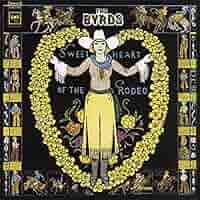
Sweetheart of the Rodeo* (1968) is a landmark album by The Byrds, representing a bold and influential pivot into country music at a time when such a move was considered unconventional for a rock band. Often credited as a foundational work in the country-rock genre, the album is as notable for its historical context as for its musical content, blending traditional country with the band’s signature harmonies and folk-rock sensibilities.
By 1968, The Byrds had already established themselves as one of the most important American rock bands with hits like “Mr. Tambourine Man” and “Turn! Turn! Turn!” But the lineup was shifting, and with Gram Parsons joining the group briefly, the band began experimenting with country music. Parsons, though new to the Byrds, brought a deep love for and knowledge of country, heavily influencing the direction of the album. Despite internal tensions and Parsons’ brief tenure, his impact shaped the sound and vision of *Sweetheart of the Rodeo*.
The album opens with a stunning cover of Bob Dylan’s “You Ain’t Goin’ Nowhere,” a light-hearted yet wistful track that immediately sets the tone with jangly guitars and warm harmonies. It exemplifies The Byrds’ ability to interpret Dylan’s work while infusing it with their evolving style.
The traditional country track “I Am a Pilgrim” highlights the group’s commitment to authentic country aesthetics, complete with pedal steel guitar and a reverent delivery. Similarly, “The Christian Life” (a Louvin Brothers cover) underscores the album’s roots in the gospel-infused side of country, though Roger McGuinn’s vocal delivery softens the original’s religious conviction.
One of the standout moments is “Hickory Wind,” co-written by Parsons. Its mournful melody and introspective lyrics capture a sense of longing and displacement, reflecting Parsons’ own turbulent life. The heartfelt performance anchors the album emotionally, showcasing Parsons’ vocal and songwriting prowess.
“Cowgirl in the Sand” introduces a playful, upbeat vibe, while the instrumental “Blue Canadian Rockies” provides a meditative interlude that highlights the musicianship of the band. The closing track, “Nothing Was Delivered,” returns to Dylan’s canon with a haunting and reflective tone, ending the album on a contemplative note.
### **Production and Vocals**
The production, helmed by Gary Usher, is clean and straightforward, emphasizing the acoustic textures and traditional instrumentation that define country music. However, one of the album’s notable controversies lies in the handling of Parsons’ vocals. Due to legal disputes with his former record label, many of Parsons’ lead vocals were replaced by McGuinn’s during post-production. This decision has been a point of contention among fans and critics, as Parsons’ original takes are widely regarded as more emotive and suited to the material.
*Sweetheart of the Rodeo* was not a commercial success upon release, as many fans and critics struggled to reconcile The Byrds’ shift away from their folk-rock roots. However, its reputation has grown over the decades, and it is now celebrated as a pioneering album that paved the way for artists like, Uncle Tupelo, The Eagles, Emmylou Harris, and even later iterations of Parsons’ work with The Flying Burrito Brothers.
The album also opened the door for greater acceptance of genre blending in popular music, legitimizing country influences within the rock world. Its authenticity, despite the initial resistance, helped dismantle some of the cultural barriers between rock and country audiences.
Despite its legacy, the album is not without its flaws. The decision to overwrite Parsons’ vocals dilutes some of the emotional depth that his contributions would have brought. Additionally, while the band’s commitment to the genre is evident, some tracks feel more like earnest pastiches than fully realized fusions. The cohesion of the album occasionally falters, as the differing musical visions of McGuinn, Parsons, and Chris Hillman seem at odds.
*Sweetheart of the Rodeo* remains a fascinating and influential work in The Byrds’ discography and in the history of popular music. Its bold embrace of country music was ahead of its time, pushing boundaries in ways that still resonate. While not flawless, its sincerity and willingness to experiment make it a cornerstone of country-rock and a testament to The Byrds’ versatility. For listeners willing to embrace its charms, the album offers a rewarding journey through the crossroads of two great American musical traditions.
